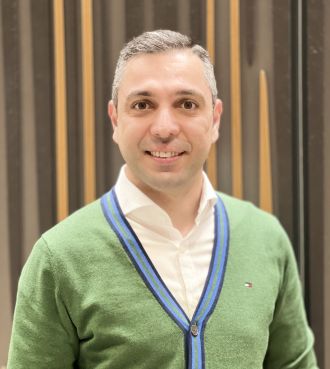Dr Mootaz Salman
About
Dr Mootaz Salman is a Group Leader in Cellular Neuroscience and MRC Career Development Fellow. He is also a Research Fellow at Wolfson College in Oxford.
His work involves investigating mechanisms of blood-brain barrier (dys)function in traumatic CNS (central nervous system) injuries and neurodegenerative diseases using patient-derived stem cells, gene editing (CRISPR-Cas 9), advanced imaging and organ-on-a-chip technologies.
After graduating with a Bachelor of Pharmacy with Honours (BPharm(Hons)) from the University of Mosul, he studied for Masters and Doctoral degrees at Sheffield Hallam University, investigating the mechanisms of brain water transport where he discovered a novel pharmacological framework for developing drugs to treat traumatic brain injuries and stroke.
Dr Salman held his postdoctoral fellowship at Harvard Medical School and Boston Children’s Hospital where he spent three years. During this time, he developed 3D in vitro models to investigate mechanisms involved in improving the effectiveness of therapeutic antibodies for Alzheimer’s disease in collaboration with Biogen.
He moved to Oxford and joined the Department of Physiology, Anatomy and Genetics (DPAG) in late 2020, working on CRISPR/Cas9 genome engineering of human iPSC-derived neurons from Parkinson’s patients to investigate molecular disease mechanisms in collaboration with GSK.
In 2021, he was awarded the Leverhulme Research Fellowship that enabled him to start his independent work and he became a Departmental Research Lecturer.
In 2023, Dr Salman launched his research group at DPAG and Kavli Institute for Nanoscience Discovery, which is primarily funded through his MRC Career Development Fellowship, and also supported by other grants including BBSRC Pioneer Award, CONNECT - Horizon2020, and Chief Scientist Office Research Grant.
His group aims to investigate mechanisms of blood-brain barrier (dys)function in neurodegenerative diseases and brain injuries, using patient-derived stem cells. They design and build innovative dynamic 3D multicellular in vitro models to accurately recapitulate the brain and blood-brain barrier function under mechanobiological stimuli, neuroinflammation and other neurodegenerative-relevant conditions.
Dr Salman has been recognised with very prestigious awards including being the recipient of the International Society of Neurochemistry (ISN) and APSN Young Neuroscientist of the Year Lectureship Award in July 2022. He received the Society for Experimental Biology (SEB) 2024 President’s Medal for Early Career Researcher in the Cell Biology Section and was named the Alzheimer’s Research UK (ARUK) David Hague Early Career Investigator of the Year in 2024. Dr Salman was also the recipient of the Inaugural ALBA-Roche Research Prize for Excellence in Neuroscience 2024 as well as being named winner for the Bayliss-Starling Prize Lecture for 2025 by the Physiological Society.
Dr Salman delivered a TEDx talk titled 'Can 3D models of brain-on-a-chip help in developing new treatments for incurable diseases?' in December 2022.
Expertise
- Brain-on-a-chip and organ-on-a-chip technologies
- Neurodegenerative diseases, ageing and dementia
- Traumatic brain injuries, stroke and spinal cord injuries
- Glympahtic clearance (the brain plumbing system to clear the toxins during sleep)
- Stem cells
- Blood-brain barrier
- New drug development for CNS injuries
Selected publications
- Emerging roles for dynamic aquaporin-4 subcellular relocalization in CNS water homeostasis (2021)
- The effects of trifluoperazine on brain edema, aquaporin-4 expression and metabolic markers during the acute phase of stroke using photothrombotic mouse model (2021)
- Recent breakthroughs and future directions in drugging aquaporins (2021)
- Aquaporin 4 and glymphatic flow have central roles in brain fluid homeostasis (2021)
- Targeting Aquaporin-4 Subcellular Localization to Treat Central Nervous System Edema (2020)
- Design and Validation of a Human Brain Endothelial Microvessel-on-a-Chip Open Microfluidic Model Enabling Advanced Optical Imaging (2020)
- Targeting transport in CNS oedema (2020)
Media experience
Dr Mootaz Salman has media experience in print and broadcast working with providers such as BBC News, Science Daily, Express & Star, CBC News and CTV News covering subjects including brain protection and the future of stroke treatment.
Recent media work
- Dr. Mootaz Salman talks about an FDA approved drug being researched to see its effectiveness on reducing stroke (CTV News, 2021)
- Potential treatment for stroke, brain injury studied with help from Saskatoon's synchrotron (CBC News, 2021)
- 'Huge therapeutic potential': University of Sask. researchers make progress on stroke treatment (CTV News, 2021)
- Study uncovers new applications for schizophrenia drug (BBC News, 2020)
- Drug that reduces swelling may help protect against brain and spinal cord injury (Harvard Medical School News, 2020)
- 'Cell pores' discovery gives hope to millions of brain and spinal cord injury patients (Science Daily, 2020)
- Schizophrenia drug ‘could help treat brain and spinal cord injury patients’ (Express & Star, 2020)
- New study on the brain's water channels gives hope to people with brain and spinal cord injuries (Science & Health, 2020)
